Thirty years after the horrific Srebrenica genocide and the widespread use of "rape camps" during the Bosnian War, survivors and memorial organizations are marking this somber anniversary with memorial services. These events aim to honor the victims, acknowledge the enduring trauma, and continue the fight for justice against those responsible for these atrocities.
A Legacy of Unspeakable Crimes
The Bosnian War, which erupted after the collapse of Yugoslavia, saw widespread atrocities, including the Srebrenica genocide and the systematic use of sexual violence as a weapon of war. An estimated 20,000 people, predominantly Bosnian Muslims, suffered sexual violence. The International Criminal Tribunal for the former Yugoslavia (ICTY) made history in 2001 by recognizing rape as a crime against humanity, convicting three Bosnian Serb army officers from Foca.
The Courage of Survivors
Despite the passage of three decades, many survivors have only recently found the strength to come forward. Zehra Murguz, 61, is one such survivor who returned to Bosnia in 2011 to bring her rapist to justice. Her courage led to a 14-year prison sentence for her assailant, a conviction she views as finally stamping him with his "true identity — war criminal."
- Enduring Silence: Many victims remain silent due to the profound stigma associated with sexual violence.
- Slow Justice: Only 18 verdicts for sexual violence crimes have been delivered in Foca, with 258 cases involving 2,046 suspects still pending.
- Exhausted Witnesses: The excessive length of legal proceedings has led to witness exhaustion.
Challenges to Justice and Healing
Survivors face numerous obstacles in their pursuit of justice and healing:
- Legal System Disparities: A law providing pensions for civilian war victims only covers the Muslim-Croat federation of Bosnia, excluding those in Republika Srpska and Brcko District.
- Perpetrator Freedom: Many perpetrators live freely, some even holding positions of authority in public institutions.
- Glorification of War Criminals: The continued glorification of war criminals in the Balkans minimizes the suffering of victims.
- Lack of Compensation: Courts frequently fail to grant victims compensation in criminal cases.
- Anonymity Concerns: Unlike in The Hague, there is no protection for witness identity in civil compensation proceedings in Bosnia.
Memorials and the Path Forward
Memorial services, such as the one held at London’s St. Paul’s Cathedral, serve as crucial reminders of the atrocities and a commitment to remembrance. While progress has been slow, the ongoing efforts of survivor groups like "Victims of the War Foca 1992-1995" and "Women Victims of War" continue to push for accountability and support for those affected. The fight for justice and recognition remains a critical, ongoing battle for the survivors of the Bosnian War.
Sources
- Survivors of Bosnia ‘rape camps’ come forward 30 years on, RFI.
- Srebrenica Memorial Day service held in London in year of 30th anniversary of genocide in Bosnia, Yahoo.
- Survivors of Bosnia ‘rape camps’ come forward 30 years on | National, Shelby News.
- Srebrenica Memorial Day service held in London in year of 30th anniversary of genocide in Bosnia, AP News.
- Survivors of Bosnia ‘rape camps’ come forward 30 years on, News.com.au.






